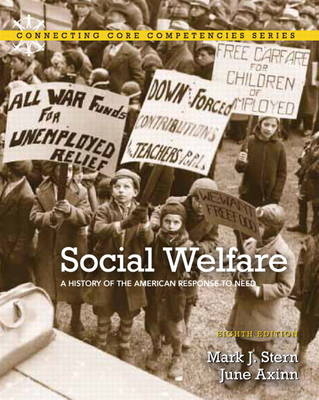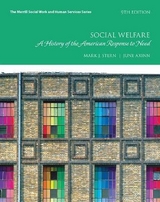
Social Welfare
Pearson (Verlag)
978-0-205-00191-0 (ISBN)
- Titel erscheint in neuer Auflage
- Artikel merken
This book is part of the Connecting Core Competencies Series. This series helps students understand and master CSWE’s core competencies with a variety of pedagogy highlighted competency content and critical thinking questions for the competencies throughout.
Social Welfare: A History of the American Response to Need allows students to place current issues of social concern in their historical context.
Numerous original documents help students understand the impact of history on current social welfare issues.The book examines the history of social work and social welfare in the United States since the 18th century. It shows how social conditions, ideas about dependency and poverty, and institutions have shaped social policy and the efforts of voluntary organizations and individuals who work with at-risk populations.
Coverage of economic developments, the impact of volunteerism, and the impact of privatization in Social Welfare: A History of the American Response to Need helps students understand the context of social welfare movements and policies. By examining forces of social change and continuity, the text helps students see contemporary topics like health care reform, welfare, and homelessness through a historical framework.
Teaching & Learning Experience
Improve Critical Thinking — Analysis of current issues requires students to think critically about historical influences.
Engage Students — Numerous original documents help to engage students and Ccontemporary and cutting-edge information on health care and LGBT rights keep readers interested.
Explore Current Issues — The text incorporates important topics of today, such as poverty, inequality, race, and gender.
Apply CSWE Core Competencies — Integrates the 2008 CSWE EPAS throughout — highlights competencies and practice behaviors and includes expensive pedagogy. The textintegrates the 2008 CSWE EPAS, with critical thinking questions and practice tests to assess student understanding and development of competency.
Support Instructors — An Instructor’s Manual and Test Bank, Computerized Test Bank (MyTest), BlackBoard Test Item File, and PowerPoint presentations are included in the outstanding supplements package.
Mark Stern is professor of social welfare and history and co-director of the Urban Studies program at the University of Pennsylvania. He has authored or co-authored five books, including One Nation Divisible: What America Was and What It Is Becoming (co-authored with Michael B. Katz). Before her death, June Axinn was professor emeritus of social welfare at the University of Pennsylvania.
IN THIS SECTION:
1.) BRIEF
2.) COMPREHENSIVE
BRIEF TABLE OF CONTENTS:
Chapter 1: Introduction
Chapter 2: The Colonial Period: 1647—1776
Chapter 3: The Pre-Civil War Period: 1777—1860
Chapter 4: The Civil War and After: 1860—1900
Chapter 5: Progress and Reform: 1900—1930
Chapter 6: The Depression and the New Deal: 1930—1940
Chapter 7: War and Prosperity: 1940—1968
Chapter 8: Conservative Resurgence and Social Change: 1968—1992
Chapter 9: Social Welfare and the Information Society: 1992—2011
COMPREHENSIVE TABLE OF CONTENTS:
Preface
Chapter 1: Introduction
DOCUMENT: Introduction
An Act for the Relief of the Poor, 43 Elizabeth, 1601
Chapter 2: The Colonial Period: 1647–1776
The Poor Laws in the Colonies
Conquest, Expansion, and Population Growth: Native Americans, Immigration, and Slavery
Challenge to the Poor Laws
Veterans: A Special Class
DOCUMENTS: The Colonial Period
An Act of Supplement to the Acts Referring to the Poor Massachusetts Bay, 1692
The Binding of Moses Love (1747).
Chapter 3: The Pre-Civil War Period: 1777–1860
Labor and Economic Security
The Reform Movements
Institutions, Almshouses, and Paupers
Child Saving
Retreat from the Almshouse
DOCUMENTS: The Pre-Civil War Period
The First Annual Report of the Society for the Prevention of Pauperism in New York City (1816)
The Constitution and By-Laws of the Female Orphan Asylum of Portland, Maine (1828)
President Franklin Pierce’s Veto of the Ten-Million Acre Bill(1854)
Chapter 4: The Civil War and After: 1860–1900
Population Changes
Naturalization and Citizenship
Regional Shifts
The Welfare of Soldiers and Veterans
Social Welfare: The Rural South
Social Welfare: Urban Problems
The Charity Organization Movement
The Social Welfare of Women
A New View of Child Welfare
The Aging: The Group That Was Left Behind
The Settlement House Movement
Conclusion
DOCUMENTS: The Civil War and After
State of New York’s Act to Provide for the Relief of Indigent Soldiers, Sailors and Marines, and the Families of Deceased Military Personnel (1887)
Josephine Shaw Lowell, “The Economic and Moral Effects of Public Outdoor Relief”, Proceedings, National Conference of Charities and Corrections (1890)
Act to Prohibit the Coming of Chinese Laborers to the United States (September 1888) and Supplement (October 1888)
Chapter 5: Progress and Reform: 1900–1930
Poverty and the Working Class
Coalitions for Reform
Social Reform: Working Conditions
Social Reform: Women, Work, and Suffrage
Social Reform: Income Security
Social Reform: Family Welfare
Social Work and the Black Population
The End of Reform
The Social Welfare of Veterans
The Professionalization of Social Work
DOCUMENTS: Progress and Reform
Florence Kelley “The Family and the Woman’s Wage” (1909)
Funds to Parents Act, Illinois (1911)
“Public Pensions to Widows” Proceedings, NCCC (1912)
Chapter 6: The Depression and the New Deal: 1930–1940
Introduction
The Hoover Response to Crisis
FDR and the New Deal
Labor and Social Welfare
Veterans and the Bonus
Public Money for Relief
Federal Emergency Relief Administration
The Social Security Act
The Eclipse of Reform
Family Life and Social Workers
New Alignments in Social Welfare
Conclusion
DOCUMENTS: The Depression and the New Deal
Monthly Reports of the Federal Emergency Relief Administration (1933)
Social Security Act (1935)
Chapter 7: War and Prosperity: 1940–1968
Population Shifts
Technology, Productivity, and Economic Insecurity
World War II
Postwar Optimism
The Attack on Public Welfare
Poverty and the Reform of Welfare
The War on Poverty
Expanded Benefits for the Aging
Controlling Public Assistance
Civil Rights and Juvenile Justice
DOCUMENTS: War and Prosperity
President Kennedy’s Message on the Public Welfare Program (1962),
Economic Opportunity Act (1964),
U. S. Supreme Court, In re Gault (1967).
Chapter 8: Conservative Resurgence and Social Change: 1968–1992
Changing Employment Patterns
The Changing Family
Poverty and Income Distribution
The Expansion of Civil Rights
Expenditures for Social Welfare
Challenging the Welfare State
Welfare Reform
Child Welfare and the Aging
The Unemployed
Women
Veterans
Conclusion
DOCUMENTS: Conservative Resurgence and Social Change
President Richard M. Nixon’s Message on Reform in Welfare (1969)
Standard of Review For Termination of Disability Benefits (1984)
Chapter 9: Social Welfare and the Information Society: 1992–2011
The Economy: Productivity, Growth, and Employment
Poverty
Changes in Family Composition
Population Shifts
The Fall and Rise of Health Care Reform
Addressing Poverty and Dependency: The Scope of Welfare Reform
Welfare Reform and “Immigration Control”
The Return to Voluntarism and the Rise of Privatization
The Continuing Civil Rights Battle
The Great Lockup
Conclusion
DOCUMENTS: Social Welfare and the Information Society
Personal Responsibility and Work Opportunity Reconciliation Act (1996)
State of California, Proposition 187, Illegal Aliens—Public Services, Verification, and Reporting (1994)
U. S. Supreme Court Lawrence v. Texas (2003)
| Erscheint lt. Verlag | 8.8.2011 |
|---|---|
| Sprache | englisch |
| Maße | 203 x 254 mm |
| Gewicht | 726 g |
| Themenwelt | Sozialwissenschaften ► Pädagogik ► Sozialpädagogik |
| Sozialwissenschaften ► Politik / Verwaltung ► Politische Theorie | |
| Sozialwissenschaften ► Soziologie | |
| ISBN-10 | 0-205-00191-2 / 0205001912 |
| ISBN-13 | 978-0-205-00191-0 / 9780205001910 |
| Zustand | Neuware |
| Haben Sie eine Frage zum Produkt? |
aus dem Bereich



